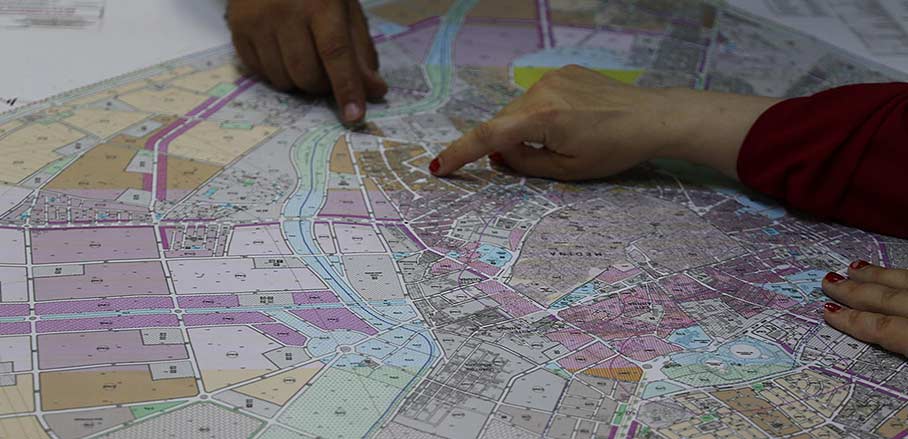Municipal Knowledge Sharing – German and Maghrebian cities in dialogue
By Imme Scheit, Jasmin Atwaa and Kathrin Faltermeier
If the New Urban Agenda is to be a success, it is of vital importance that cities form partnerships and learn from each other. Such activities are already under way: in this article, URBANET presents an example of municipal knowledge sharing between cities in the Maghreb region and cities in Germany.
In 2016, the GIZ launched the project “Sharing of Knowledge between Municipalities in the Maghreb and Germany” on behalf of the German Ministry for Economic Cooperation and Development (BMZ). The project aims to support municipalities in Morocco, Algeria and Tunisia in their effort to make their cities more liveable, as well as generate added value from the developmental commitments of German cities. Based on their long tradition of municipal self-government, German cities are experienced in the implementation of projects at municipal level and are able to pass on such knowledge.
In the Maghreb, the project mainly targets small and medium-sized cities. Unlike larger cities, they have traditionally been excluded from international networks and the knowledge sharing that happens within these networks. Additionally, these cities also have less financial and staff capacities at their disposal, which has impeded successful project implementation.
Such being the case, the knowledge sharing project aims to bring together up to 25 cities in Tunisia, Algeria and Morocco in project partnerships with German municipalities and other local government bodies concerned with municipal self-government. As part of this cooperation, they are looking to implement small projects that engage with questions of administrative modernisation and municipal development.
The “Sharing of Knowledge between Municipalities in the Maghreb and Germany” project developed out of the regional programme “Strengthening of Municipal Development and Democracy” (known to the partners as “CoMun-programme” due to its French title “Coopération Municipale”). Through a South-South-exchange between cities in the Maghreb, this initial project strengthens local capacities and supports the participating cities in assuming an active role in the process of their own development. The new project was initiated when the Maghrebian partners started requesting consultation from German cities. Both are now led by the same team, so that they are able to profit from existing experiences and established contacts.
The project’s potential in practice
Different from traditional town partnerships, the knowledge sharing project aims to create a variety of forms of cooperation. Many sectors – mobility, energy efficiency, waste management and good governance, for instance – facilitate the participation of civic organisations working to make sure that municipalities in the Maghreb and in Germany provide services in a transparent and citizen-friendly manner. Through collaborative planning, knowledge transfer is initiated and a municipal cooperative relationship is built, which supports the decentralisation reforms in Morocco and Tunisia as well as the gradual political opening in Algeria.
Since the “Sharing of Knowledge between Municipalities in the Maghreb and Germany” project provides for a close cooperation with German municipalities and their umbrella organisations, it is implemented together with the Service Agency Communities in One World (SKEW) of Engagement Global GmbH. It also envisages other activities in Germany.
The projects were proposed by the Maghrebian municipalities, thus ensuring that they are as demand-oriented as possible. In a next step, the proposals were jointly screened and then selected together with the three lead executive agencies of the respective partner country, considering multiple criteria such as gender equality and civic participation. German municipalities were asked to express their interest in a general topic area or to sign up in support of a specific project. At the opening conference in Bamberg from September 4-6, representatives of German and Maghrebian cities met and and drafted first proposals for project partnerships. Among the participants were representatives from Algeria, Germany, Libya, Morocco and Tunesia, as well as Thomas Silberhorn, parliamentary state secretary at the Federal Ministry for Economic Cooperation and Development, and the Tunisian ambassador to Germany.
The projects planned by the German-Maghrebian partnerships include, for example, measures to improve the equipment of socio-cultural institutions, or the upgrading of urban areas like green spaces, parks and playgrounds. They also encompass activities in the area of domestic waste disposal and city cleaning. Modernising measures, such as the introduction of e-governance and document management systems, are implemented to enhance the quality of municipal service provision.
By collectively solving the challenges that Maghrebian municipalities face, German cities gain an in-depth understanding of the situation and the available resources in cities in the Maghreb. In order to do share their experiences with each other, partners get together for workshops where they plan and implement the small projects. They also meet for expert events, study trips and work exchanges.
Global partnerships – a win-win for both sides?
More and more people from North Africa come to live in Germany, and German municipalities are working to integrate them into daily life. By cooperating and communicating, cities from the Maghreb region and Germany can improve their municipal structures. On the one hand, Maghrebian municipalities can benefit from the experiences of their German counterparts when it comes to establishing local self-governance. On the other hand, the cooperation offers German municipalities the possibility to better understand North African immigrants and their background, as well as the opportunity to establish permanent, inclusive and enhancing municipal working relations in common projects.
Moreover, both CoMun and the knowledge sharing project contribute to reaching the Sustainable Development Goals (SDGs) of the 2030 Agenda and the Paris Agreement (COP21), as well as the future New Urban Agenda. The implementation of these global agreements requires various measures that need to be put into practice in the cities as well as by the cities. For example, SDG 17 calls for the renewal of global partnerships – one of the key components of the projects described. Additionally, both endeavours contribute to strengthening cities as actors of development.
- Collaborating for a geographical information system in Kairouan - 8. November 2016
